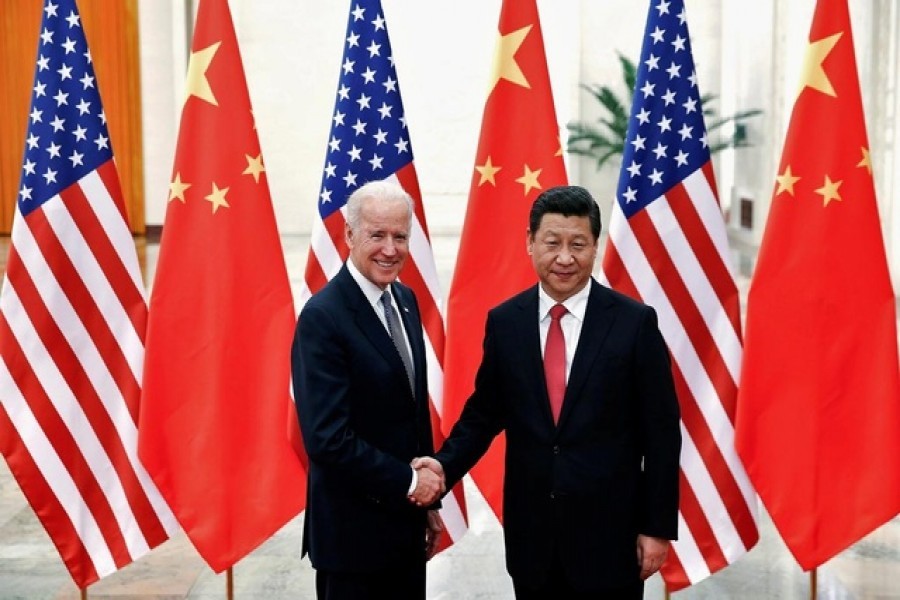
Published :
Updated :

November 16's XI-Biden virtual summit did not come up with any joint communique. It has obviously led to a lot of head-scratching among the political pundits. Has then the summit between the world's two largest economies ended in a fiasco? But the media reports did not say anything about any bitterness from either side of the conversation. Actually, it was a conversation between two old friends, as the Chinese president Xi Jinping put it. But was that conversation necessary? No doubt it was necessary, otherwise the US president would not have proposed holding of the summit in the first place. So, he tried to define the purpose of the talks as one about 'managing risks' and 'the need for common sense guardrails to ensure that competition does not veer into conflict.' Clearly, neither side was willing to engage in a military conflict, though they may vehemently differ on issues including the Taiwan Strait, Hong Kong, the Uighur Muslims' human rights issue in Xinjiang, the status of Tibet or the long-term strategic interests between the US and China in the Indo-Pacific region. So, it appeared both sides were happy at the end of the dialogue.
Though China has emerged as the world's largest economy, it is yet to be a military power as big as the US. So, there is no point holding Cold War era-like summits that would take place between the then-superpowers in a bipolar world, the now-defunct Soviet Union and the USA. The US-Soviet talks of those days used to centre around limitation of arms, nuclear arms, in particular. From that perspective, China would forcefully oppose any arms limitation talks with the USA. For both in terms of the number of strategic nuclear arms and conventional weapons China is still way behind the USA. In that case, China's priority now, to all intents and purposes, is to fast increase its nuclear as well as conventional arms capabilities to match those of the US so that it can face the US in the Taiwan Strait on an equal footing if and when such a situation arise. As such, the US knows it full well that China will fiercely oppose the idea of any such talks at the moment.
It was plain from the US president Joe Biden's stance on various Trump-era issues including the ongoing trade war with China, Taiwan and other areas of interest that there would be no softening of the US's position regarding the Sino-US relations. Though his methods would not be as crude as those of the former president Donald Trump, or his language more diplomatic and civilised, the essence of those would remain basically the same. It has to be understood that the competition or conflict between an existing superpower and one that is fast emerging as the next superpower would be far more complex than it used to be during the Cold War. The Cold War clash of interests was solely focused on the military rivalry, whereas the present one has its economic dimensions, too. In truth, the economic interests of the US, China and the rest of the world are so deeply entangled that neither would like to see a sudden collapse of the other. For that would be disastrous for the entire world economy. That means, the world should be prepared for a protracted clash of interests between the big world powers. But why has the West with the US as its leader until now has forever to be at war with China? On the face of it, as it is often described by the Western powers, it is a clash between two values and systems. The West is for an open society, democracy, human rights, free speech and so on and so forth. China, according to them is a closed society that does not believe in all that the West believes. And since it is a conflict between two systems, two world views, it is beyond resolution. That is how the rivalry between the US and the erstwhile Soviet Union used also to be explained. So, also are the explanations being produced to justify the US versus China or, for that matter, the West vs. China discords. But can different social or political systems not coexist and as such have to be always at each other's throat? Was the seven decades long Cold War rivalry between the US and the Soviet Union only about two different social systems? To be fair, all the talk about values and ideals are often the veils to conceal the real intentions. And it is always about the basic human instinct to dominate. The West has been dominating the world since the mid-eighteenth century's Industrial Revolution in Europe. After the First and the Second World Wars, the power centre gradually shifted to the other side of the Atlantic, the USA, to be specific. Now their powers are on the decline and new world powers are emerging in the East. And as it is always the case, a new, emerging power is never given an easy ride. Hence all the bluster about values, democracy, human rights, etc. In real world they do not exist. What matters are narrow national interests.
So, for sure, the power struggle between emerging China, other big and small powers including Russia and the declining West will continue to dominate world events during the rest part of the 21st century.


 For all latest news, follow The Financial Express Google News channel.
For all latest news, follow The Financial Express Google News channel.